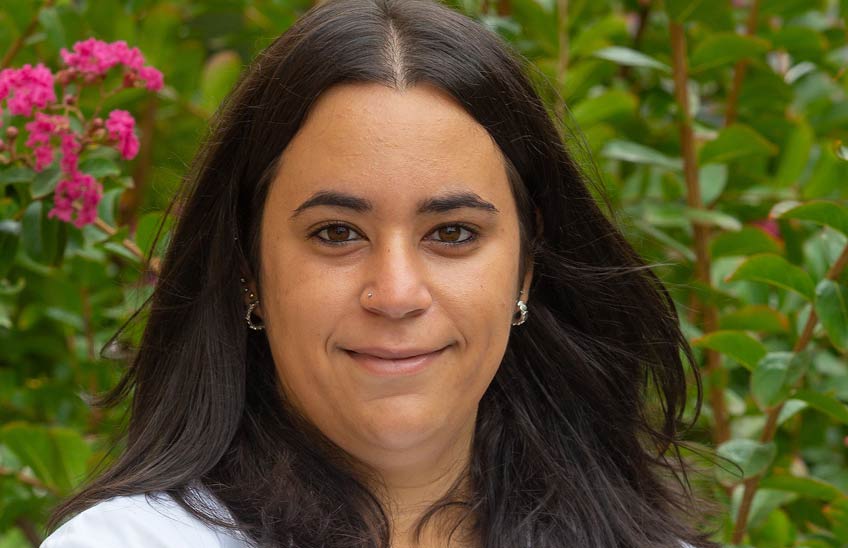approach multidisciplinary to tackle antibiotic resistance
A study by the University of Navarra addresses this health problem from a human, animal and environmental perspective.

FotoManuel Castells<br>/Lara Pérez
23 | 11 | 2021
Lara Pérez (Sesma, 29 years old) has studied, in her doctoral thesis , the problem of antibiotic resistance from a approach multidisciplinary perspective, focusing on surveillance and control in animal, environmental and human environments. This research is inspired by the "One Health" initiative, which proposes the study of the global health of the planet from this triple perspective.
"We want to raise awareness among the general public about the problem of antibiotic resistance, stressing its rational use and informing them about the need to work in multidisciplinary to guarantee the global health of the planet," says the researcher from Navarre.
In human health, Dr Pérez Etayo has worked on the diagnosis and treatment of infections caused by bacteria resistant to beta-lactam antibiotics - those antibiotics that contain a beta-lactam ring in their molecular structure, such as penicillin or cephalosporins. "The employment of different types of antimicrobial peptides (small proteins) and bacteriocins (antimicrobial substances produced by lactic acid bacteria) as treatments in human health could be considered as very important alternatives to treat and prevent this problem".
Furthermore, in the animal environment, the antimicrobial efficacy of kaolin-silver (clay containing silver nanoparticles) has been evaluated for possible inclusion in animal feed as an alternative measure to the use of antibiotics in animal production. "The kaolin-silver material has been able to prevent the growth of a wide variety of micro-organisms, including multi-resistant bacteria. The inclusion of this zootechnical additive in animal feed would reduce the use of antibiotics in animal production," he adds.
And in the environmental area , "a wide presence of multi-resistant bacteria has been detected in different aquatic environments (rivers, wastewater treatment plants, hospital sewers and slaughterhouses) in northern Spain and southern France, with resistance to penicillins and cephalosporins being the most prevalent".
For this researcher, it would be interesting to continue the search for alternative treatments for these infections by evaluating other compounds similar to antimicrobial peptides as a treatment strategy. In addition, according to Dr. Pérez Etayo, it would be interesting to evaluate the biosafety of kaolin-silver for use in animal production.
Antibiotic resistance is one of the most important problems for the World Health Organisation (WHO). In 2015 the WHO approved a global plan to tackle this problem and since 2017 Spain has had a National Antibiotic Resistance Plan.
Lara Pérez has a degree in Biology (2014), Master's Degree in Biomedical research (2015), and a PhD from the School of Sciences of the University of Navarra (2021). This research has been developed at the department of Microbiology and Parasitologyof the University of Navarra under the direction of Dr. David González and Dr. Ana Isabel Vitas.
development The work, developed in the framework of the project OUTBIOTICS, has been financed by the European Regional Fund (ERDF) through the Interreg V-A Spain-France-Andorra programme (POCTEFA 2014-2020) and its general goal is the elimination of antibiotics in the waters of the POCTEFA territory (Spain-France-Andorra).
Bibliographical references
→ Pérez-Etayo, L.; González, D.; Leiva, J.; Díez-Leturia, M.; Ezquerra, A.; Lostao, L.; Vitas, A.I. Antibacterial Activity of Kaolin-Silver Nanomaterials: Alternative Approach to the Use of Antibiotics in Animal Production. Antibiotics 2021, 10, 1276. https://doi.org/10.3390/antibiotics10111276
→ Pérez-Etayo, L.; González, D.; Leiva, J.; Vitas, A.I. Multidrug-Resistant Bacteria Isolated from Different Aquatic Environments in the North of Spain and South of France. Microorganisms 2020, 8, 1425. https://doi.org/10.3390/microorganisms8091425
